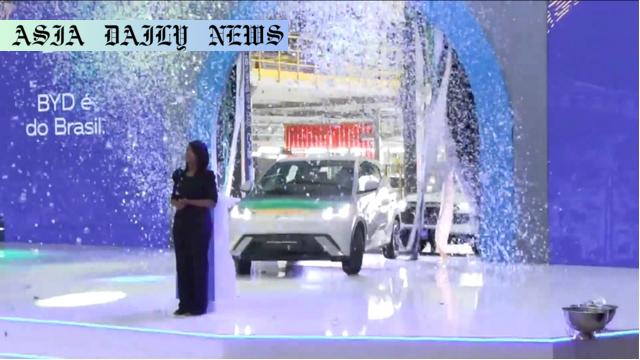BYD: Chinese automaker BYD is set to revolutionize Brazil’s EV market with its newly unveiled plant in Bahia State.
BYD will begin producing EVs in Brazil within weeks.
The factory is located in Bahia and aims to produce 150,000 vehicles annually.
Local economic contributions and challenges like labor lawsuits are significant factors.
Competition with other automakers in Brazil continues to rise.

BYD’s South American Venture: Driving the Electric Revolution
In an exciting move towards expanding its global footprint, Chinese electric vehicle (EV) powerhouse BYD is gearing up to begin operations in its first South American factory located in Bahia State, Brazil. The facility, described as a key enabler for green mobility in Brazil, aims to start rolling out vehicles within weeks. Showcasing an initial annual production capacity of 150,000 vehicles, this plant exemplifies BYD’s ambitious agenda of not only meeting global EV demands but also establishing its mark in untapped markets like South America.
The highlight of the unveiling event held this week was BYD’s commitment to making Bahia the ‘Silicon Valley of South America.’ This reflects the company’s broader mission to redefine market benchmarks and foster innovation. The plant also grabbed media attention as it displayed a car assembled locally — a testament to BYD’s technical and operational progress in the region.
Promising Economic Boost but Facing Complex Challenges
From an economic standpoint, the impact of the BYD factory in Brazil cannot be overstated. Beyond facilitating EV adoption, BYD has positioned itself as a contributor to the local economy by creating jobs and fostering technological expertise. This expansion aligns with the Brazilian government’s strategy to encourage green energy solutions, making BYD’s presence a strategic advantage for both parties. However, the project has also faced scrutiny amid troubling allegations regarding labor exploitation. A lawsuit was filed earlier this year alleging slavery-like working conditions for nearly 200 Chinese workers at BYD and its contractors. BYD has yet to fully address these allegations, adding a complex layer to an otherwise promising venture.
Nonetheless, BYD’s expansion plan for the Bahia plant seeks to double its capacity eventually, signaling confidence in future growth and adherence to region-specific targets. Coupled with strategic partnerships and investments in technological innovations, BYD is betting on a long-term narrative of growth and sustainability in South America.
Fierce Market Competition Awaits
BYD is not the only global automaker eyeing Brazil’s rapidly growing EV market. As demand for electric vehicles surges, competitors like European and Japanese automakers are also entering the fray, creating a fiercely competitive environment. China’s dominance in EV manufacturing gives BYD a starting advantage, but leveraging this will require robust strategies and adherence to ethical practices. Moreover, gaining consumer trust amidst allegations of labor misdeeds will be critical for thriving in such a high-stakes arena.
This backdrop sets the stage for a larger global narrative, highlighting Brazil as a key growth market for EV makers. BYD’s market entry serves as yet another chapter in the unfolding story of how developing nations are embracing green energy and what brands need to sustain long-term relevance. All eyes will be fixed on BYD’s operations in Bahia, as success or failure here is likely to reverberate across its global strategy.
Commentary
Global Expansion as a Testament to BYD’s Vision
BYD’s decision to open its first South American factory is a bold and calculated step that reflects the company’s long-term vision. The emphasis on making Bahia the ‘Silicon Valley’ of South America signals not only their ambition but also their tech-driven narrative of growth. As EV adoption picks up globally, BYD’s strategic focus on emerging markets like Brazil demonstrates their commitment to bridging the economic and technological gaps in such regions.
This move also strengthens Brazil’s position as a burgeoning EV market. A robust entry by a global EV leader such as BYD serves as inspiration for local firms, potentially leading to infrastructural and technological upgrades in the country. However, the path ahead is fraught with challenges, ranging from operational triggers to reputational risks posed by labor-related controversies. In this sense, BYD must proceed with diligence, ensuring that ethics and innovation go hand in hand.
Opportunities Outweigh Challenges in EV Expansion
There’s no denying the massive potential of BYD’s entry into the South American market. From job creation in Brazil to accelerating the adoption of EVs, the benefits are manifold. However, the backdrop of allegations regarding worker exploitation poses a severe threat to BYD’s credibility. Addressing these issues promptly and transparently will be paramount for their sustained success in Brazil.
Even beyond the controversies, BYD faces stiff competition from established players like European and Japanese automakers. The market is only going to heat up further, requiring BYD to focus on offering not just competitively priced vehicles but also those that stand out in quality, safety, and sustainability.
Conclusion: Setting the Stage for a Greener Future
BYD’s venture in Brazil is more than just a regional expansion — it’s a milestone in the global EV revolution. Through innovation, strategic planning, and proactive conflict resolution, BYD has the chance to set industry standards while contributing to a greener planet. As the EV maker takes its first South American steps, the world will be keenly watching not only its production numbers but also its ability to merge ethical practices with technological excellence.


